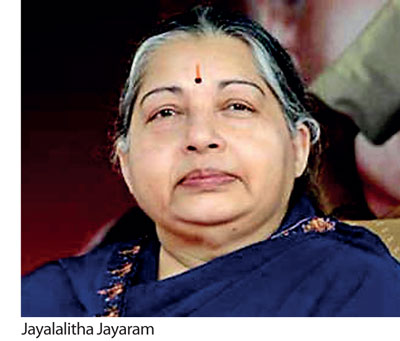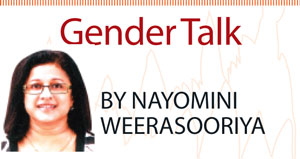09 Dec 2016 - {{hitsCtrl.values.hits}}
 It is a concept unique to South Asia – there is unlimited adulation for charismatic leaders. Although our topic today is about the women, the adulation is for men and women alike.
It is a concept unique to South Asia – there is unlimited adulation for charismatic leaders. Although our topic today is about the women, the adulation is for men and women alike.
The passing away of Tamil Nadu’s best known female chief minister marked not just the end of an era but also one that was marked with tremendous loyalty expressed by her followers. They called her Amma and elected her six times as their chief minister. Scandals hit but to the people, Jayalalitha could do no wrong. Some committed suicide on her behalf while others died of heart attacks unable to withstand her electoral losses when
she lost.
But then that’s South Asia, where women face discrimination, particularly in countries like India, but where also the Matha or the maternal deity concept is alive and well when it comes to female leaders. Indira Gandhi was one such figure – she stood tall over India, the all-seeing mother figure who could do no wrong.
There were others – strong women often elected on a dynasty, yet trusted by the people even when they could not deliver. The people see only what they want to see in these female leaders. They  ignore the rest, often financial misappropriation scandals, wanting to believe in the myth of the infallible mother figure who would lead them on.
ignore the rest, often financial misappropriation scandals, wanting to believe in the myth of the infallible mother figure who would lead them on.
Unfortunately, the same sense of respect and concern does not extend to the other ranks of women in these countries. Women are often seen as usable and objects of sexual attention. Women continue to face rape and harassment and the figures keep increasing. Some incidents are never brought to light.
Yet, have these charismatic female leaders who commanded such love and respect of their people, been able to do something, anything to make sure that things would become better for the women in their countries? Not really, if you go by their track records. Most of them governed of course during a different era – the world was not what it is today, less connected and less exposed. Still, they could have set in motion changes that would have made things better for the women in
those countries.
Despite having a female prime minister and a female chief minister, India continued to discriminate against the girl child. That status quo did not change. Even today, some of the most horrible cases of sexual harassment are reported there. The social stigma of having a daughter before a son is still as real as ever. As much as change has come during the years, that change has not been enough. Obviously, the connection between a semi-goddess maternal leader and her impact on gender has not been felt down the line.
So why has it happened that way? Did the leaders themselves not inspire the people they led? What examples did they set in encouraging their people to do the same? How did they respond to violence against women and children, to discrimination against women, against dowry deaths and bride burnings?
The rest of the world elected female leaders long after South Asia – Sri Lanka was the first followed by others. It probably was the second biggest achievement for women in the aftermath of obtaining voting rights – that too after a considerable struggle. Perhaps the social order of the day was not in line with such changes – these female leaders were not expected to encourage and foster the empowering of gender relations but rather, they stood as genderless figures perhaps, ones who were above gender defining, which could be why they could never do much towards improving gender relations in the first place.
Yet, when some day, history will look back on these leaders, these questions will be asked and those will be questions without answers.
(Nayomini Weerasooriya, a senior journalist, writer and a PR professional, can be contacted at [email protected])
10 Jan 2025 21 minute ago
10 Jan 2025 41 minute ago
10 Jan 2025 2 hours ago
10 Jan 2025 2 hours ago
10 Jan 2025 3 hours ago